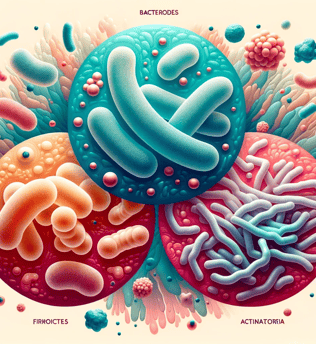The Gut Microbiome: The City Within
Part 2 of 8: Defining the Gut Microbiome
PROBIOTICS
Fully Livin
10/24/20234 min read


The Gut Microbiome: The City Within
The human body is often likened to a marvel of intricate machinery, but the analogy falls short when we consider the gut – the city within us, teaming with life in the form of trillions of microorganisms. This thriving ecosystem, aptly referred to as the "gut microbiome," plays an indispensable role in shaping our overall health and well-being. Understanding the gut microbiome is not only fascinating but is also crucial in appreciating the central role that probiotics play in promoting gut health.
Defining the Gut Microbiome
At its core, the gut microbiome is a complex, dynamic community of microorganisms that call our digestive system home. It consists of an astonishing variety of bacteria, viruses, fungi, and other microorganisms, each contributing to the bustling ecosystem that resides within us. The sheer diversity of life within our gut is awe-inspiring, and its significance in overall health cannot be overstated.


The Diverse Inhabitants of the Gut
The gut microbiome is a bustling metropolis where countless microorganisms coexist and interact. The most predominant inhabitants are bacteria, and they come in an astounding array of species. While some are beneficial, others may be harmful, making the balance between these microbial species a critical determinant of gut health.
Notably, some well-known bacterial groups that populate the gut include Bacteroides, Firmicutes, and Actinobacteria. However, these are just a fraction of the microbial diversity found in our intestines. Moreover, the gut is also home to viruses like phages and fungi like Candida. Each of these microorganisms plays a unique role in maintaining the equilibrium of this microbial city.
The Gut Microbiome and Its Multifaceted Impact
The gut microbiome is more than just a passive audience to the process of digestion. It actively influences various aspects of health, forming a symbiotic relationship with the host. Here are some of the key ways in which the gut microbiome contributes to our overall well-being:
1. Digestion and Nutrient Absorption
Digestion is a complex process involving the breakdown and absorption of nutrients from the food we consume. The gut microbiome actively participates in this process by aiding in the breakdown of complex carbohydrates, fermentation of dietary fibers, and the production of essential vitamins, such as B vitamins and vitamin K. Moreover, the gut microbiome has been shown to influence our metabolism, which can have implications for weight management.
2. Immune Function
The gut is a frontline defender against invading pathogens, and the gut microbiome plays a crucial role in training and regulating the immune system. The microorganisms in the gut help educate the immune cells, ensuring they can differentiate between harmful invaders and harmless food particles. A well-balanced gut microbiome is essential for maintaining a robust immune response and preventing autoimmune diseases.
3. Mental Health
Recent research has unveiled the intricate connection between the gut and the brain, often referred to as the gut-brain axis. The gut microbiome produces neurotransmitters and communicates with the brain via the vagus nerve, influencing mood, stress response, and even cognitive function. A balanced gut microbiome is increasingly recognized as a factor in mental health and conditions like anxiety, depression, and stress-related disorders.
4. Metabolic Health
The composition of the gut microbiome can have a significant impact on metabolic health. Studies have linked an imbalanced gut microbiome to conditions like obesity, type 2 diabetes, and metabolic syndrome. It's believed that the gut microbiome can influence metabolism by affecting energy extraction from food and regulating inflammation.


The Quest for Balance: A Healthy Gut Microbiome
While it's evident that the gut microbiome plays an instrumental role in various aspects of health, it's crucial to emphasize the concept of balance within this complex ecosystem. A healthy gut microbiome is one in which the beneficial microorganisms outweigh the potentially harmful ones, fostering a harmonious environment that contributes to overall well-being.
A balanced gut microbiome is characterized by a diverse array of microbial species living in symbiosis. Diversity in this context is a key marker of gut health because it signifies that the microbiome is resilient and can adapt to various challenges, from dietary changes to stress.
To maintain a balanced gut microbiome, it's essential to consider both the composition and function of the microorganisms living within. A healthy gut is not solely about the number of bacteria but also about their specific roles and how they interact with one another. This intricate balance is the cornerstone of gut health and the key to reaping the benefits of probiotics, which are expertly equipped to restore and maintain this balance.
In the subsequent sections of this blog, we will delve deeper into the realm of probiotics, elucidating their mechanisms of action, their health benefits, and the sources from which they can be obtained. Through this exploration, you will gain a comprehensive understanding of how probiotics act as guardians of the gut microbiome, fostering a balanced and harmonious internal ecosystem that supports overall health and vitality.
